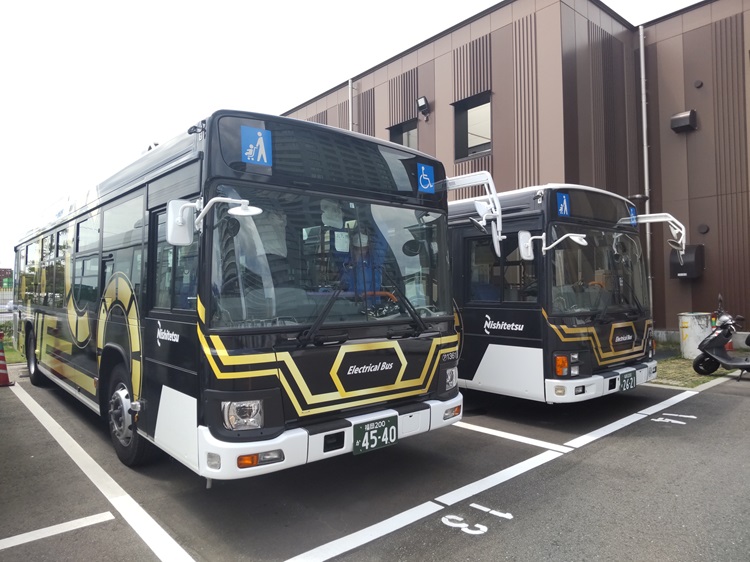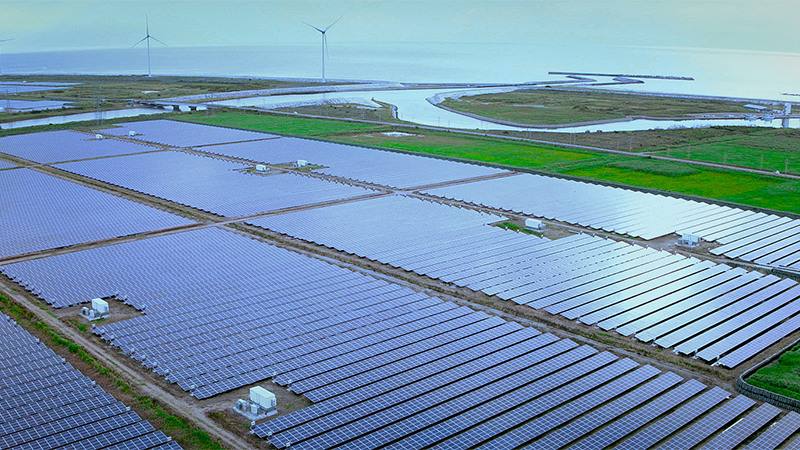Sep. 27, 2021
Sumitomo Corporation
Sumitomo Corporation Kyushu Co., Ltd.
Nishi-Nippon Railroad Co., Ltd.
Nishitetsu Bus Kitakyushu Co., Ltd.
Expanding Introduction of Electric Buses Toward Low Carbon Society
Sumitomo Corporation (Head Office: Chiyoda-ku, Tokyo), Sumitomo Corporation Kyushu Co., Ltd. (Head Office: Hakata-ku, Fukuoka-shi; hereinafter, “Sumitomo Corporation Kyushu”), Nishi-Nippon Railroad Co., Ltd. (Head Office: Hakata-ku, Fukuoka-shi; hereinafter, “Nishitetsu”), and Nishitetsu Bus Kitakyushu Co., Ltd. (Head Office: Kokurakita-ku, Kitakyushu-shi; hereinafter, “Nishitetsu Bus Kitakyushu”) (collectively, “the four companies”) will conduct a pilot experiment using electric buses at the Kokura Vehicle Depot Office of Nishitetsu Bus Kitakyushu and the Island City Vehicle Depot Office of Nishitetsu (hereinafter, “the Pilot Experiment”).
Public transportation with low environmental impact, including electric buses, is growing in importance as Japan strives toward the goal set forth by its government of achieving carbon neutrality by 2050. While the introduction of electric buses is expected to further contribute to the reduction of CO2 emissions, there are a number of issues that need to be addressed. These include the high cost of adoption and operational concerns with regard to optimal charging infrastructure, bus operation management, and electricity procurement.
The Nishitetsu Bus Kitakyushu Kokura Vehicle Depot Office will adopt a retrofit* electric bus converted from a used Japan-made diesel bus. The electric bus was jointly developed with Taiwan’s largest electric bus manufacturer, RAC Electric Vehicles (hereinafter, “RAC”), in which Sumitomo Corporation acquired a stake in 2019. Offering longer cruising range than conventional retrofit electric buses, the bus will contribute to reducing CO2 emissions. Under the Pilot Experiment, a range of issues with regard to driving performance, environmental impact, and operations will be verified. In the long run, the four companies aim to reduce modification costs by retrofitting the buses in Japan, and increase the number of high-performance, low-cost electric buses in operation. The Pilot Experiment has been selected as a target project under the Kitakyushu City Future Environmental Technology Development Subsidy Program.
In anticipation of operating multiple electric buses in the future, the Nishitetsu Island City Vehicle Depot Office will employ a vehicle owned by Sumitomo Corporation in addition to the existing bus to verify the operation of two electric buses as well as optimal charging management.
Through the Pilot Experiment, the four companies will work together to further promote the use of electric buses within the Nishitetsu Group. With the aim of contributing to achieving carbon neutrality by 2050, the four companies are determined to resolve issues toward the proliferation of electric buses and help establish sustainable public transportation.
*To modify an old type of machine by improving its performance and/or adding new functions.

Electric buses to be used in the pilot experiment
| Applicable Vehicle Depot Office | Nishitetsu Bus Kitakyushu Kokura Vehicle Depot Office | Nishitetsu Island City Vehicle Depot Office | |
|---|---|---|---|
| Current usage of electric buses | To be newly adopted | To be additionally adopted | Already in use |
| Base vehicle | Japan-made large diesel bus | ||
| EV conversion company | RAC Electric Vehicles of Taiwan | Japanese company | |
| Drive battery | 235 kWh | 78k Wh | 105 kWh |
| Lithium-ion battery | Lithium-ion battery | ||
| Cruising range | 150 km (estimated value) | 35 km (estimated value) | 45 km (estimated value) |
| CO2 reduction effect (vs. existing diesel buses) |
57% (estimated value) | 33% (estimated value) | |
Pilot experiment at Nishitetsu Bus Kitakyushu Kokura Vehicle Depot Office
| Applicable Vehicle Depot Office | Kokura Vehicle Depot Office (1-2 Sunatsu 1-chome, Kokurakita-ku, Kitakyushu-shi) |
|---|---|
| Planned operation section | Route between Kokura and Kurosaki (approximately 14 km one way) |
| Scheduled start of operation | February 2022 or after |
| Number of buses to be adopted | 1 |
| Verification contents | ・Vehicle performance of the newly adopted bus |
| ・Cruising range with no load / with air conditioner load / with passengers | |
| ・Optimal charging management |
Pilot experiment at Nishitetsu Island City Vehicle Depot Office
| Applicable Vehicle Depot Office | Island City Vehicle Depot Office (1-9 Kashiiteriha 5-chome, Higashi-ku, Fukuoka-shi) |
|---|---|
| Planned operation section | Route between Island City Teriha and Chihaya Station (approximately 5 km one way) |
| Scheduled start of operation | October 2021 |
| Number of buses to be adopted | 1 (2 including existing vehicle) |
| Verification contents | ・Vehicle performance of the additionally adopted bus |
| ・Multiple bus management (e.g., specification of charge/discharge unit, optimal charging management) |
Initiatives to be taken by each company
<Sumitomo Corporation>
The Beyond Mobility Business Dept. was established in April 2021. It connects the mobility business with other industrial sectors to develop new businesses that lead to the solution of social issues. Under this Pilot Experiment, Sumitomo Corporation will not only provide its electric bus, but also develop a retrofit electric bus featuring lower adoption cost and longer cruising range compared with conventional retrofit electric buses by collaborating with Taiwan’s largest electric bus manufacturer RAC, in which Sumitomo Corporation acquired a stake in 2019. In the long run, the Company aims to increase electric buses and help achieve a low carbon society by providing bus operators nationwide with an electric bus adoption/operation service on a subscription basis while also conducting energy management.
<Sumitomo Corporation Kyushu>
Deeply rooted in Kyushu, Sumitomo Corporation Kyushu provides diverse solutions for customers in the Kyushu/Okinawa region by leveraging the global resources of the Sumitomo Corporation Group. The company will undertake the Pilot Experiment as a step toward developing new products and services that contribute to the decarbonization of the region. By harnessing the know-how acquired through the project, the company will strive to proliferate electric buses in the region in collaboration with local public transportation operators.
<Nishitetsu Group>
With the aim of helping create a low carbon society, the Nishitetsu Group adopted an electric bus at its Island City Vehicle Depot Office in February 2020, and has since conducted test operation of the bus by measuring distance travelled and gauging the effect of operation cost reductions at the Office. Upholding “Strengthening of Efforts from the Perspective of ESG and SDGs” as one of its priority strategies under its Revised 15th Medium-Term Management Plan, the Group will strive toward achieving a low carbon society across all its business activities, including the Pilot Experiment with electric buses.
Sumitomo Corporation’s Material Issues
Sumitomo Corporation Group positions “Six Material Issues to Achieve Sustainable Growth with Society” as an important factor in developing business strategies and in the decision-making process for individual businesses. Going forward, we will pursue sustainable growth by resolving these issues through our business activities. This project especially contributes to the following material Issues.
- Inquiries
- Corporate Communications Department, Sumitomo Corporation
- News Release Contact Form



